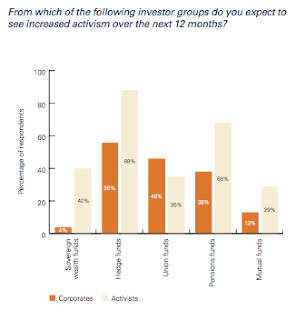Bebchuk, Cohen, and Wang of Harvard University just recently released a report examining the relationship between staggered boards and firm value. While numerous reports have found a negative correlation between classified boards and firm value, one must be cautious in determining causation. Are classified boards merely a product of low-valued firms or are they actually responsible for yielding a negative impact on firm value?
In determining causation, the researchers implemented a quasi-experiment that made use of an October 8, 2010 ruling by the "Delaware Court of Chancery… approv[ing] the legality of a shareholder-adopted bylaw that shortened the tenure of directors". The case concerned a takeover contest between Airgas, Inc. ("ARG") and Air Products and Chemicals, Inc. ("APD"), where the bylaw would move ARG's annual meeting earlier in the year to January (from August). The "January bylaw" would thus have the effect of limiting the extent to which ARG's staggered board could entrench incumbent directors.
As it turns out, following the ruling in favor of the "January bylaw", firms with staggered boards experienced positive abnormal stock returns, compared to those without staggered boards. Companies with late annual meetings, Delaware incorporation, non-supermajority voting requirements, below-industry return on assets, and small firm size, increased most notably in value. All told, five days following the ruling, firms with staggered boards increased 50 risk-adjusted basis points in value over those without staggered boards.
The study goes beyond the scope of prior research by indicating causation: staggered boards negatively impact firm value.
It is no surprise then that Georgeson reports an average of 65%+ shareholders voting in favor of the 187 shareholder proposals to de-stagger boards during the 2006 - 2010 proxy seasons. It should also be of no surprise that between 2000 and 2009, "the number of S&P 500 companies with classified boards declined from 300 to 164". Download Georgeson's 2010 Annual Corporate Governance Review
With that said, about half of "the over 3,000 public companies whose takeover defenses are tracked by FactSet Research Systems still have staggered boards". That leaves quite a few firms vulnerable to some corporate governance criticism from their investor base.
No doubt the findings in this report will be used to help bolster support for many activist investors seeking to remove a company's classified board structure. In our opinion, companies interested in taking a proactive approach to avoiding shareholder activism, de-staggering the board may present an attractive option and should be seriously studied in conjunction with the merits associated with the company's other defense mechanisms.
No doubt the findings in this report will be used to help bolster support for many activist investors seeking to remove a company's classified board structure. In our opinion, companies interested in taking a proactive approach to avoiding shareholder activism, de-staggering the board may present an attractive option and should be seriously studied in conjunction with the merits associated with the company's other defense mechanisms.
The report can be found here.
***
IMPORTANT NOTE: On November 17, 2010, ARG appealed Chancellor Chandler's decision to the Delaware Supreme Court. Just yesterday, on November 23, 2010, the Delaware Supreme Court ruled in favor of ARG (overturning Chancellor Chandler's decision) determining the shareholder-approved bylaw to be illegal. ARG fell sharply 5.92% that day to $62. Thus, (assuming no other outside influence on ARG's stock) the report's findings not only remain consistent, but also are further validated.
Posted by David Schatz
Image extracted from (1).















